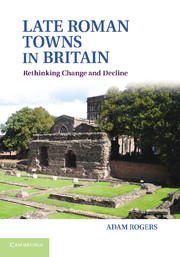Book contents
- Frontmatter
- Contents
- List of illustrations
- List of tables
- Preface and acknowledgements
- 1 Introduction
- 2 Edward Gibbon: growth, the Golden Age, and decline and fall
- 3 Approaches to Roman urbanism and studying the late Roman town
- 4 Establishing the urban context: pre-Roman place and Roman urbanism
- 5 Structures of the public buildings in the later Roman period: framing place and space
- 6 New public structures within towns in the later Roman period
- 7 Industrial activity within public buildings
- 8 Timber buildings and ‘squatter occupation’ within public buildings
- 9 Senses of place: rethinking urbanism in late Roman Britain
- References
- Index
9 - Senses of place: rethinking urbanism in late Roman Britain
Published online by Cambridge University Press: 04 April 2011
- Frontmatter
- Contents
- List of illustrations
- List of tables
- Preface and acknowledgements
- 1 Introduction
- 2 Edward Gibbon: growth, the Golden Age, and decline and fall
- 3 Approaches to Roman urbanism and studying the late Roman town
- 4 Establishing the urban context: pre-Roman place and Roman urbanism
- 5 Structures of the public buildings in the later Roman period: framing place and space
- 6 New public structures within towns in the later Roman period
- 7 Industrial activity within public buildings
- 8 Timber buildings and ‘squatter occupation’ within public buildings
- 9 Senses of place: rethinking urbanism in late Roman Britain
- References
- Index
Summary
This book set out to explore new ways to study late Roman urbanism in Britain. It represents an attempt to move away from unquestioning perceptions of towns in the later Roman period and urbanism in the Roman period as a whole. The approach taken also necessitated an examination of the late pre-Roman settlement pattern. Amongst prehistorians theoretical developments have greatly advanced our understanding of the late Iron Age, and their approaches can be useful for understanding aspects of the Roman period. Methodologies for studying the late pre-Roman and the late Roman periods in Britain have often differed considerably. Analysis of the late pre-Roman period is embedded in traditions within prehistoric archaeology, whilst examination of the later Roman period has drawn on perspectives from classical archaeology and ancient history. In this book, both methodologies were brought together to provide a coordinated view.
Roman towns developed within the context of pre-existing and numinous landscapes, continuing, but also transforming, aspects of the way in which certain places were experienced, a tradition that continued into the late Roman period. Rather than representing a decline in standards in late Roman towns, this perspective indicates that activity continued the use of these places in meaningful ways. They need to be considered both in terms of what occurred on these sites previously and in terms of the continued use of these places as creative and vibrant localities.
- Type
- Chapter
- Information
- Late Roman Towns in BritainRethinking Change and Decline, pp. 176 - 182Publisher: Cambridge University PressPrint publication year: 2011



